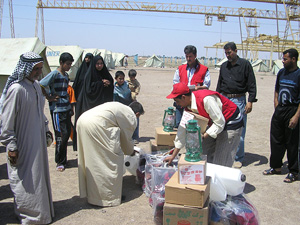
The delay in forming a new Iraqi government following elections in March is adversely affecting internally displaced persons (IDPs) and refugees, according to a senior UN official.
“This situation certainly makes it more difficult to move ahead to find durable solutions,” Walter Kaelin, a representative of the UN Secretary-General responsible for the human rights of IDPs, said on 29 September during an eight-day visit to the country.
“What we have seen in the last six months is that the number of returns really has come down quite considerably… People are waiting to see what is going to happen,” he said.
Daniel Endres, the representative of the UN Refugee Agency (UNHCR) in Iraq, said the number of returning refugees and IDPs has gone down from an average of 15,000-20,000 a month in the 18 months before the election to about 10,000 a month.
Endres said 45 percent of the refuges questioned by UN staff at border crossings with Jordan and Syria said they did not want to return permanently because of “political uncertainty”. Others questioned cited the security situation (15 percent) and poor public services (40 percent) as reasons for not wanting to return permanently.
The 7 March vote produced no clear winner, setting up a fight between the Sunni-backed Iraqiya bloc of Ayad Allawi and the State of Law coalition of Prime Minister Nouri al-Maliki, a Shiite. Allawi narrowly defeated al-Maliki in the vote, but both men claim they have a mandate to form a new government.
Kaelin said: “The complexity of the internal displacement situation in Iraq requires stronger efforts by the Iraqi government and the international community to protect the human rights of displaced persons, address their immediate needs and find durable solutions to end their displacement.”
He called for an “inclusive and comprehensive strategy that takes into account all communities affected by displacement, including host communities and communities in areas of return.”
He also highlighted the need to meet immediate humanitarian needs, and ensure equitable access to basic services.
According to an August 2010 UNHCR report, Iraq has an estimated 1.5 million IDPs, including about 500,000 in settlements or camp-like situations in extremely poor conditions who are a priority for protection and emergency assistance.
There are also over1.5 million Iraqi refugees or asylum-seekers, mainly in countries in the Middle East.
sm/at/cb
Theme(s): Refugees/IDPs,
[This report does not necessarily reflect the views of the United Nations]
